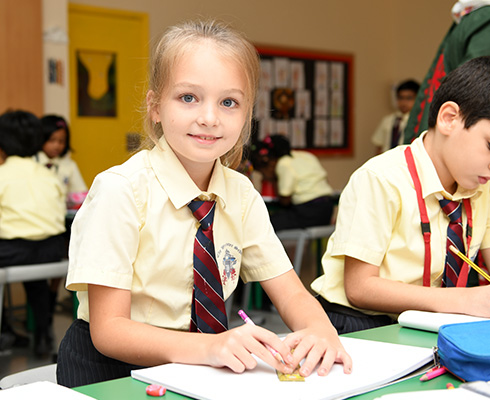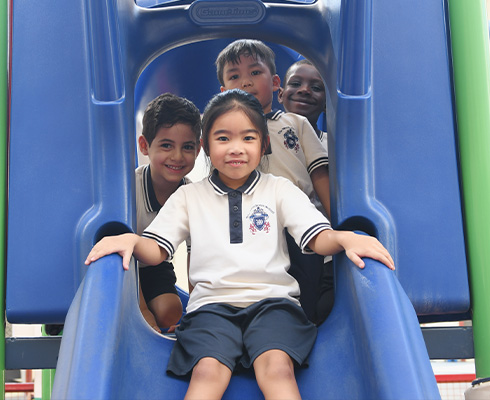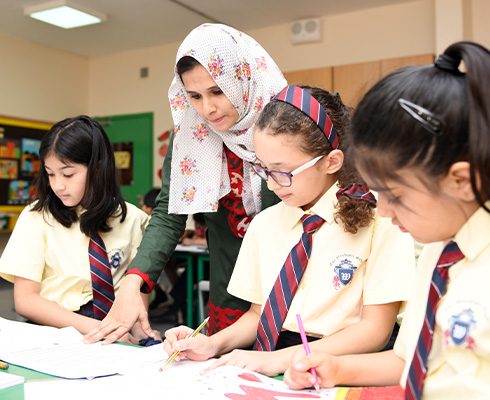Key Stage 3 - Post-16
Secondary School
Ages 11 - 18
GEMS Winchester School Dubai delivers an international curriculum that is sensitive and respectful of Arabic culture and local traditions. Our enhanced National Curriculum for England integrates 21st century skills and competencies to develop confident, resilient and adaptable young adults for an ever-changing world.
“Education is not to reform students…or to make them expert technicians. It is to unsettle their minds, widen their horizons, inflame their intellects, teach them to think straight.” - Robert Maynard Hutchins, former University of Chicago President.
-
Secondary School
-
Key Stage 3
-
Key Stage 4 & Post-16

LEENA ATKINS
Head of Secondary
Meet The Head of Secondary
Meet The Assistant Principals - Key Stage 3


Richard Smith
Assistant Principal - Key Stage 4 & Post-16
Meet The Assistant Principal - Key Stage 4 & Post-16
I have been working for GEMS in Dubai for the last three years, I have an experience of 8 years in the field of education and hold multiple qualifications in Mathematics. I have had the pleasure of working at three very different schools giving me a wealth of experience of international education.
Key Stage 3
-
Overview
At GEMS Winchester School Dubai, Key Stage 3 is the first three years of Secondary schooling, for students aged between 11 and 13 and comprises three distinct year groups; Year 7, 8 and 9. Like all other Key Stages and phases in the school, in KS3 we teach a traditional British curriculum adapted for an international context, blending the UAE Ministry of Education syllabus with the National Curriculum for England.
-
Core Subjects
- English
- Mathematics
- Science
- Arabic A for Arabic speakers, or Arabic B for non-Arabic speakers
- Islamic for Muslim students*
- UAE Social Studies
* Non-Muslim students will study Personal, Social, Health and Citizenship Education (PSHCE) during these lessons.
-
Foundation Subjects
- Moral Education
- Digital Learning (Information and Communication Technology)
- Geography
- History
- Art
- Physical Education (PE)
-
The 7 Competencies
Students in KS3 are supported by talented teachers to develop the necessary knowledge, understanding and skills required to be successful learners throughout their lives. We strongly believe in developing our students holistically and seek every opportunity to develop them academically and as well-rounded global citizens. We have a competency-based approach to learning, which are firmly embedded into all aspects of the curriculum, providing all learners with the opportunity to develop mastery across each area.
In KS3, we will seek to develop the following 7 competencies, known as ‘The WSD 7C’s’:
Collaboration
Students are able to effectively work with others, whether in pairs or as part of a larger team. They collaborate in a positive respectful manner that results in productive outcomes.
Critical Thinking
Students are able to apply classroom-based learning to real world context and make connections across areas of learning. They analyse results to form sound judgements, as well as evaluate their work in order to identify possible improvements. Plans to achieve their goals are well thought out.
Curiosity
Students are able to engage in and take responsibility for their learning. They actively seek answers to the bigger questions of ‘how’ and ‘why’ to quench their thirst for knowledge. Enquiry skills are a strength and students are able to complete independent research both with and without the use of technology.
Creativity
Students are able to break away from convention as they explore ideas attributed to their unique way of thinking. Students are innovative and resourceful in their approach and are not afraid to take calculated risks. They are able to think outside the box, whilst still maintaining any design brief.
Communication
Students are able to communicate effectively with peers and adults alike. They use a wide range of interactive learning strategies, including roleplay, peer teaching and presentations. In addition to being able to clearly express themselves, explain their work and articulate their ideas, students are also active listeners.
Consciousness
Students are able to demonstrate strong social awareness and possess the ability to make moral judgements that inform decision making. Students are culturally aware and emotionally intelligent, showing appreciation and tolerance of the views of others, even when they differ from their own.
Confidence
Students are able to take risks in their learning while maintaining firm belief in their ability. They grasp opportunities to make decisions, take responsibility and lead wherever possible. Students thrive on challenge and have the mindset to keep going, even when it is tough.
Key Stage 4
-
Overview
Our Key Stage 4 curriculum is imaginatively designed to provide a wealth of opportunities where students can take intelligent risks, ask questions to satisfy their intellectual curiosity and explore ideas to deepen their understanding; while promoting critical thinking skills. We allow students to develop their knowledge, understanding and creativity through a curriculum underpinned by the GEMS Core Values of ‘Leading through Innovation, Pursuing Excellence, Growing by Learning, and Global Citizenship’. This approach fosters our students’ readiness for some of the finest universities both in the UAE and overseas and their employability.
For our students starting KS4, choosing their iGCSE subjects is a key point in their school life, as this is when they begin to broaden their educational horizons, prepare themselves for university and take their initial steps towards future careers. As such we expect all students to select a balanced range of subjects. To ensure all of our students are on the correct path WSD offers various support leading up to, during and after the options selection process.
-
Core Subjects
In KS4, students study 8 iGCSE subjects, all students will take the following Core subjects:
- English (First Language or Second Language)
- Maths
-
Option Subjects
In addition to these, students will also study various combinations of the following Option subjects:
- Biology
- Chemistry
- Physics
- Combined Sciences
- Arabic (compulsory for Arab students)
- Art
- Accounting
- Business Studies
- Computer Science
- Drama
- Economics
- English Literature
- French
- Geography
- Global Perspectives
- History
- ICT
- Media Studies
- Physical Education
- Sociology
- Travel & Tourism
-
Ministry of Education Curriculum Subjects
Alongside the iGCSE subjects, students also have one lesson of Physical Education per week and study the Ministry of Education Curriculum subjects:
- Islamic for Muslim students*
- Moral Education
- Social Studies
* Non-Muslim students will study Personal, Social, Health and Citizenship Education (PSHCE) during these lessons.
-
Prospectus
Post-16
-
Overview
We are extremely pleased and excited that we now offer a full curriculum in Years 12 and 13. After students have finished their iGCSEs they have the opportunity to specialise more in their studies. They will study fewer subjects, but in much greater depth, preparing them for further study at university or success in employment. In Years 12 and 13, students can study either A-Levels or BTEC. There are various pathways open to students in Years 12 and 13:
- An A-Level pathway for our elite students, aiming for an undergraduate degree at university in the future
- An international BTEC (Level 3) pathway for students who are already sure about their career-choice or the area of study they wish to focus on at university; this is the pathway for students who would benefit from a career-related pathway to university
- A blended pathway, comprising of a mix of BTEC and A-levels (or AS-levels)
- As an inclusive school, we are also able to offer personalised pathways to students in Years 12 and 13 that need to reinforce some of the iGCSE concepts that are not yet secure.
Further information about the pathways is below, including entry requirements. We believe that only students qualified to follow a particular pathway should gain entry.
-
International A-Levels
International A-Levels are challenging, globally recognized qualifications, respected and accepted by universities around the world. Typically, students choose three or four subjects to study in Year 12; they can either study their chosen subject for one year leading to an AS-Level (half an A-Level) or for two years, leading to a full A-Level.
Because of the challenging nature of A-Levels, at WSD we have strict entry requirements. Students will be required to achieve at least five iGCSEs, including English and Maths, at grade 4/C or better. In the subjects that they wish to study at A-Level, they will be required to achieve at least a grade 6/B (7/A for Maths and Physics). For students coming from other curriculums, there will be an interview process including some assessments to check for suitability.
The following subjects will be available as A-Level subjects for the next academic year. Students that enroll will be able to make initial selections but again these will only be confirmed after iGCSE results have been released.
- Mathematics
- Biology
- Chemistry
- Physics
- English Literature
- Accounting
- Business Studies
- Economics
- ICT
- Computer Science
- French
- Art
- Global Perspectives
- Travel & Tourism
-
BTEC (Vocational) Pathway
WSD offers Level 3 International BTEC Extended Diplomas in both Business Studies and Information Technology. BTEC courses are career-related courses that provide the theoretical underpinning and academic rigour of a Level 3 programme, as well as helping students develop skills and competences required for lifelong learning; these courses allow learners to apply the knowledge and skills they gain in real-life scenarios. BTEC International Level 3 qualifications are 100% internally assessed through assignments and practical tasks; assessments are set and marked by the school, so a real benefit of BTEC that it is assessed purely through coursework and not through exams.
An international Level 3 BTEC Extended Diploma is a two-year qualification equivalent to three A-Levels. However, the course is very flexible and there are smaller qualifications that can be achieved in one year. International BTEC qualifications are accepted at many universities around the world. Students will be required to achieve five iGCSEs, including English and Maths, at grade 4/C or better in order to gain entry to this pathway. For students coming from other curriculums, there will be an interview process including some assessments to check for suitability.
-
Other Subjects
Alongside the A-level or BTEC pathways, students study Arabic (if they are Arab passports holders) and Islamic Studies and Moral Education as per the Ministry of Education guidelines.
If students follow the A-level pathway, they will be required to complete a research-based qualification called International Project Qualification (IPQ) which is a well-respected qualification with universities as it teaches some key skills universities look for. It is also equivalent to an additional AS-Level qualification
If you require any further information about Key Stage 4 or 5, please check out our Frequently Asked Question section below, or alternatively do not hesitate to contact the school.
-
Prospectus
Frequently Asked Questions
-
Do you offer opportunities for Student Leadership?
There are many opportunities for Student Leadership in the school. Please click here to access our information about Student Leadership.
-
Do we get to choose which class and sets we are in?
In the Secondary Phase, students are placed into the class we feel is most appropriate for them to be successful learners. In some subjects this involves setting, which will be determined by each Department. In other subjects we choose mixed-ability classes.
For more information, please contact the relevant Head of Department.
-
How much homework will we receive in the Secondary phase?
In KS3, students should expect to receive approximately 1 hour of Home Learning each week from their Core Subjects (English, Maths, Science, Arabic and Islamic). In their Foundation Subjects, students should expect to receive 30 minutes of Home Learning each week.
In KS4 and 5, students should expect to receive approximately 1 hour of Home Learning in each of their examination subjects each week, as a minimum.
-
Are we allowed to bring a phone to school?
We know that many of our families are keen for their son or daughter to bring a phone to school so they can have a way of communicating with them when their child is either coming to school, or returning home.
However, during the school day, it is our expectation that mobile phones will be turned off and not used.
-
Will our classes be mixed boys and girls?
From September 2020, all classes in each phase of the Secondary school will be co-educational.
-
Will the students stay in one classroom, or will they move to different rooms?
In the Secondary Phase, it is common for students to move to different classrooms for each of their lessons.
-
Will we have assemblies in the Secondary phase?
In KS3, we have built time into our timetable for students to have assemblies each week. This also continues as necessary in KS4 and Post-16.
-
What extra-curricular activities and trips will there be?
Students will have the opportunity to take part in extra-curricular activities on Tuesday afternoons between 2.15pm and 4pm each week. We also run many school trips throughout the year, both for academic reasons (such as fieldwork trips) and as rewards for great behaviour, progress and attendance.
Please click here to access our information about such activities.
-
How big will the class size be in the Secondary phase?
The average class size across the Secondary phase is 30 students.
-
Who will monitor student behaviour in the Secondary phase?
Student behaviour, attendance and welfare are over seen by a number of people in each year group. Each Key Stage has an Assistant Principal for strategic oversight of the year groups within their phase.
Each Year Group within a phase has a Head of Year, and each Year Group is broken down into Tutor Groups who have a designated Tutor. All of these staff members work together to ensure our students attend school regularly, behave really well and develop as well-rounded human beings.
-
What can we do to help support students as parents?
There are many things parents can do to support their child while they are at home. This includes ensuring your child has great attendance, that they complete their Home Learning to a good standard and hand it in regularly, as well as attending parent-teacher conferences to ask questions and hear how their child is progressing at school.
Read more about parent partnership here.
More To Explore
-
Curriculum Overview
Offering a world-class education founded on an elaborated National Curriculum for England (NCfE).
-
Student Care and Support
We are here to provide support to our students to ensure they are safe and prepared for the future.





